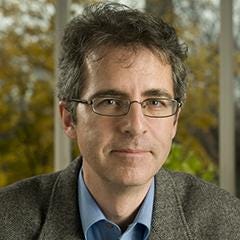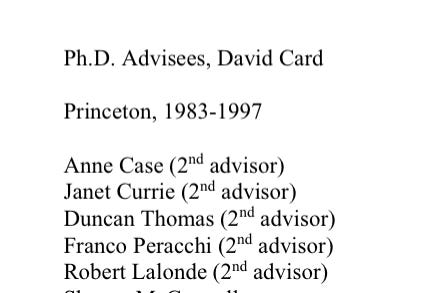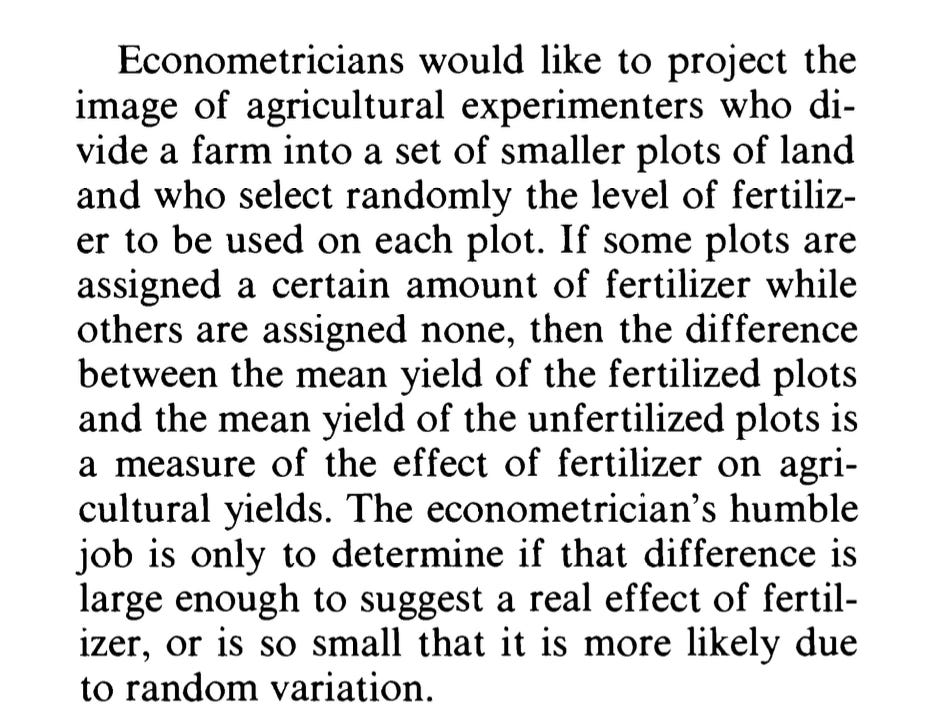A Brief Sketch of Bob Lalonde and his job market paper
The late Bob Lalonde, labor economist, causal inference, program evaluation and selection bias in the NSW data
Sometimes really fascinating things remain invisible to us until we shift our gaze away from them. I noticed this when I was a kid looking up at the stars. I learned early on that I often couldn’t see a star if I looked directly at it, but I could if I averted my vision just a small bit away. This, I later learned, was a real thing and it occurs because of how our eyes are designed. While the center of our retina (called the fovea) excels in sharp, colorful visions under bright light, it's the peripheral part, abundant with light-sensitive rods, that shines in low-light conditions. So when we try to observe faint stars, and do so by looking directly at them with our fovea, we often cannot see anything. But, if we slightly shift our gaze, allowing the image to fall where the rods dominate, these stars suddenly become discernible.
In today’s substack, I am going to employ a similar kind of averted vision by talking about the late labor economist, Bob Lalonde. But most of the time, I’m going to talk about him indirectly by moving in between him and his job market paper, as well as quotes from his advisers, his students, and then comments on causal inference more generally. I’ll be discussing his thesis, which was later published in the American Economic Review, but I prefer to do it by bouncing around rather than plowing through either his biography or his paper only. I am hoping that by moving between all the topics, you’ll learn more about him and his work since I can only provide low light conditions for you as I did not know him.
As many of you probably have guessed by now, writing a biography of causal inference is at the top of my bucket list. A biography of the ideas, the places, and the people. The story of causal inference as it takes place within the modern fields of labor economics, econometrics and statistics. Its focus is Princeton in the 70s and 80s, Harvard from the 70s to the 90s, and Chicago at the same time. It is important to me to learn the stories and retell them as best I can. And so for now, I’m just going to be retelling what little I do know, but still try to offer my speculations as to his importance in the story of labor economics and causal inference. But I’ll also be trying to share what things I’ve learned about what a special man he was.
Background
Robert (“Bob”) Lalonde was a well known figure within the labor economics community during his lifetime, as well as the economics profession more broadly. He passed away in 2018 after spending nearly his entire career at the Harris School at Chicago where he was celebrated as a great professor, a great colleague and a great labor economist.
He was born in 1958, grew up in Syracuse, New York and attended Westhill High School. He received an A.B. from the University of Chicago in 1980 a PhD in economics from Princeton in 1985. His PhD advisers were Orley Ashenfelter and David Card. Card started out as Lalondes slightly older classmate some cohorts ahead, and when he graduated, he returned to Princeton as a faculty member. I asked Card for his list of advisees and here are the first five. Though Lalonde shows up fifth here, my understanding is he was Card’s first PhD advisee. Lalonde graduated in 1985, Anne Case and Janet Currie both in 1988, Duncan Thomas in 1986 and Franco Peracchi in 1987.
Another person who spoke highly of Lalonde was a classmate from a slightly later cohort, Josh Angrist. Josh also overlapped with Lalonde a little, and from what I could gather from our interview, he admired Lalonde’s work. Here’s two clips from the interview where he mentions Lalonde’s thesis (published in the American Economic Review in 1986) as inspiring him. First, after around a minute from where I cued it up, Josh talks about the exciting things happening at Princeton when he applied, and one of them was Lalonde’s thesis. And then he mentions the thesis again, at the 19:16 mark, where Josh says that one of the papers he would’ve been proud to have written was Lalonde’s thesis.
Lalonde’s thesis grew on me over time. When I first read it, I did not really understand what it was doing, and it’s taken me a long time to get it. I think it’s hard to understand Lalonde’s thesis if you don’t understand that time period, because it’s very much a thesis that was endogenous to the problems in empirical labor then. Listen to the opening paragraph.
This connection between “what the econometrician does” and “what a randomized experiment does” is pretty common rhetoric in modern empirical microeconomics, but really moreso if you do come from the “design based causal inference” tradition. You will often hear applied microeconomists explain to students causal inference by asking them to imagine if they had all the money in the world, what experiment would they run? Even just the framing of the applied econometric study as a randomized experiment is thought to be helpful because it clarifies what the causal question is at all.
But Lalonde’s opening paragraph is also striking because it is almost a verbatim homage to Ed Leamer’s classic “Taking the Con out of Econometrics” published one year earlier in the same journal. Listen to Leamer’s opening paragraph to his article too.
And yet in both Leamer and Lalonde
I’ve always had a particular interpretation of Lalonde’s thesis. I’d let my imaginations run ahead of me without me noticing. I shared a theory with Card and asked him if it was accurate, but Card said it wasn’t. I had thought maybe Lalonde’s thesis, which I’ll explain more of later, had been an indictment of contemporary empirical labor at the time since it exposed problems within the practice of program evaluation. If that was what it was, it would have surprised Card, I take it, because as Card says, that was not the kind of person Lalonde was. You can hear Card’s response to that question in the video below, at the 38:00 mark where I’ve got it cued up to around 39:40.
According to Card, Lalonde’s thesis was not intended to point fingers at anyone or anything. He wanted to the work to be helpful. Card said anything else was inconsistent with his personality. Such was his reputation to his former classmate and adviser.
After graduating from Princeton in 1985, Lalonde took a job at Michigan State as an assistant professor where he stayed for three years before going to his undergraduate alma mater, the University of Chicago. What did it feel like to go back home like that I wonder. His tenure home was at the University of Chicago’s Harris School and he stayed in it for the rest of his career until his death in 2018 from a longtime illness.
At this stage of my bucket list writing, I only have little things here and there that I’ve overheard, read online, or been told by select groups of people. But that said, from what I’ve been told, Lalonde was widely respected and even cherished at that school. When he passed away, it appeared there were many broken hearts. I deduced this by the public outpouring of love from colleagues, coauthors, and students alike. From what I could see, people thought of him as a wonderful person. Listen to some quotes said by friends and colleagues collected by Robin Mordfin here.
Daniel Diermeier, provost at the University of Chicago, a professor in the Harris School, and its former dean said, “[Bob Lalonde was] held an unwavering commitment to his students that made him a beloved, much sought-after teacher and mentor. [He] leaves behind a lasting legacy of impact in his field, as well as on the many lives he touched here at the University.”
Keep reading with a 7-day free trial
Subscribe to Scott's Mixtape Substack to keep reading this post and get 7 days of free access to the full post archives.








